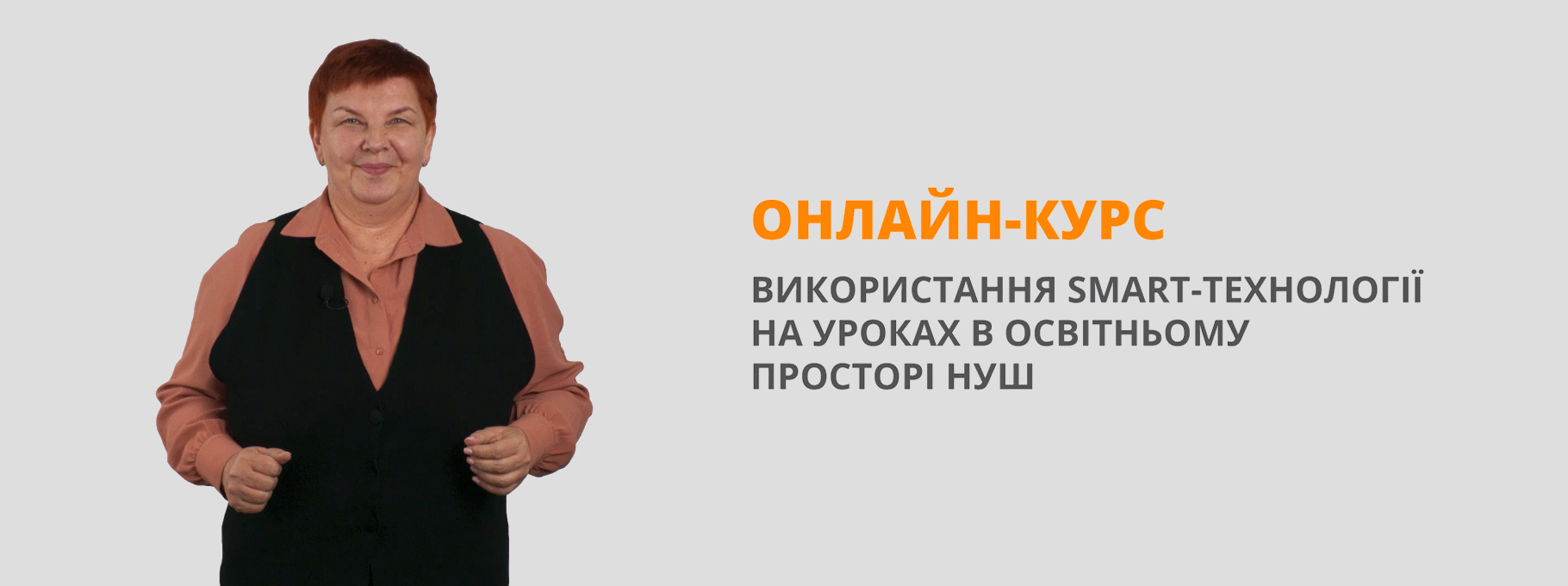Урок ''Ми та навколишнє середовище"
Посібник містить матеріали та розробки уроків з англійської мови по темі “We and the environment. Pollution". Збірник містить тексти, завдання, ілюстрації та іншу інформацію.
Призначений для вчителів загальноосвітніх шкіл.
Lesson №1
Topic: Global problems.
Aim: Повторити і активізувати навчальний матеріал.
Ознайомити учнів з новою лексикою.
Навчати спілкуватися за темою.
Удосконалювати комунікативну компетенцію.
Equipment: CD, a tape-recorder.
Procedure
- Greetings.
- Aim.
Today we`ll speak about global problems. We are going to learn new words, phrases, expressions.
- Warm-up (уведення в іншомовну сферу).
T: What is environment? Think it over and make a list of five things you suppose relate to environment. Read your lists out loud and using these ideas, make the Mind-map.
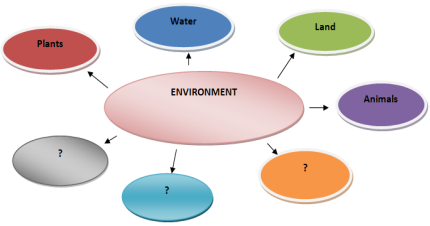
- Introduction.
- New words, phrases. Expressions. CD 1, track 15, p.60
And there are many problems that we can’t but discuss. We’ll need some new vocabulary to do it. First look at the blackboard and pronounce the words after me. And now I give you the cards with the word and its explanation. Try to read and translate the sentences.
Environment is the land, water and air in which people, animals and plants live.
To pollute – to make air, water, soil, etc dangerously dirty.
Pollution is the process of polluting the place.
To cause means to make something happen.
Destruction is the act or process of destroying something.
Shortage is the situation in which there is not enough of something that is needed.
Dump is a place where unwanted waste is taken and left
To dump means to drop or put something somewhere in a careless way.
Waste means things you no longer want.
Poison is a substance that can kill you or make you sick if you eat it, breathe it, etc.
To poison means to make the land, lakes, rivers dangerous by adding harmful chemicals to it.
Nuclear means relating to the central part of an atom.
Weapon is something that you use to fight with.
To survive means to continue to exist.
To endanger means to put someone or something in a dangerous or harmful situation.
Well done!
- Go Ahead! P.60
Look at the posters and say which of the environmental problems them are typical of your country.
- Speaking
T: all the progressive humanity is very concerned about the future of our planet. Because the ways of life in many parts of the world have changed. What are these changes caused by?
P1: Changes in the weather and the climate.
P2: Work of large factories and planets.
P3: Nuclear electric power stations.
P4: Cars on the roads of the towns.
P5: Fires in the forest.
P6: Disappearing of different animals and birds.
T: Now, read out loud the following quotations, translate them and say if you agree with these words.
- “ The nation that destroys its soil, destroys itself” – these are the words of the American President Franklin Roosevelt.
- “Mother planet is showing us the red warning light – be careful – she is saying. To take care of the planet is to take care of your own house”. ( The Dalai Lama)
- “ Look after your planet, it’s the only one we have,- this was the dramatic appeal of Prince Philip of Britain, President of the WWF ( World Wildlife Fund).
T: What do you think of it? Is it really our duty to look after our planet? Why?
- Your Helping Hand. SB p.63 c
Work in groups, make a list of necessities for nature protection and say why you find them the most important.
- Reading.
- Your Language Portfolio: SB p.63
Read the newspaper and magazine articles about environmental problems and choose the proper titles for each of them.
- Vocabulary practice. SB p.66 b
Look at the photos and describe one of the global issues.
- Homework.
- Your Language Portfolio: Reading. WB p.26 c
Think and decide on how people of the world may change the situation for the better by words and deeds.
- Learn new words.
- Summarizing.
T: What problem is considered to be one of the most global?
P3: Ecological situation
T: What is ecology?
P3: Literally the word “ecology” means “a study of home”.
T: Is it possible do you think to solve the ecological problems? What can personally you do to keep the environment clean?
Lesson 2
Topic: Environmental protection. Green Peace.
Aim: - to reuse lexical material on the topic and use it in the pupils` speech;
- to develop creative thinking;
- to show the importance of environmental protection for people all over the world;
- to bring up love to the native land its nature.
Equipment: CD, a tape – recorder.
Procedure
- Greetings. Aim.
T: - Good morning, children!
Ps: - Good morning, teacher!
T: - I`d like to tell you about Earth Day. This holiday is celebrated on the 22 of April. It was initially a tree planting holiday in the USA. But now it`s a day to show our concern about our mother Earth. At our next lessons we are going to have ecological conference and now we`ll be preparing for it.
2. Warming up.
T: Look and repeat.
Help save the Earth!
Help save the Earth!
Ecologize, economize,
Recycle and reuse.
It`s all up to you
To help save the Earth!
T: What is this chant about? (About ecology, about our planet, about its protection). You are right. The topic of our lesson is Environmental protection. Today we speak about the Earth and its pollution.
3. Interaction.
- Look at the blackboard. Match the words which can be used as a word combination, pronounce them and make up a short dialogue.
- Soil
Air Pollution
Water
- heavy
metallurgical
light Industry
chemical
machine building
- Work in pairs. Make up the dialogue.
P1: What kinds of pollution do you know?
P2: I know soil pollution, air pollution and soil pollution.
P1: how do you think what is the most dangerous industry?
P2: I think heavy and chemical industrials are the most dangerous.
- T: Match the words and make up own sentences.
- Chemical a) wastes
- Industrial b) problems
- Ecological c) protection
- Drinking d) pollution
- Environmental e) resources
- Natural f) water
(chemical pollution, industrial wastes, ecological problems, drinking water, environmental protection, natural resources)
T: Read your sentences, please.
P1: What are the main ecological problems in your town?
P2: What is the level of chemical pollution?
P3: We`ve got some drinking water.
4. Reading.
T: - Now you read the text about material reuse. You must translate it. When you have finished, compare your version with the translating version. At first say, what means material reuse. Now do you understand it?
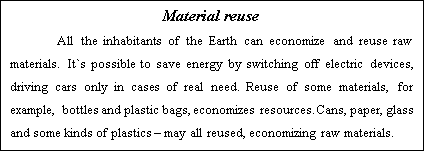
Compare
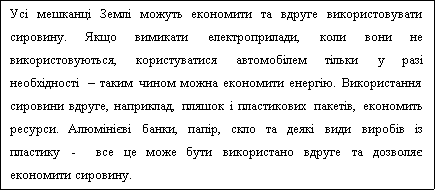
T: - Answer the questions, please. What can people do to economize energy? What materials may be reused? What pupils can do for it?
5. Listening.
T: - Pupils, what is Green Peace? (It`s organization which tries to protect our ecology). You are right. Joan Collins is a member of “Green Peace”. She has come to take part in the ecological conference. Now read what Joan Collins told the pupils of a Kharkov school about her organization.
Green Peace
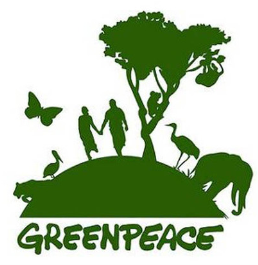
I am a representative of one of the most known international ecological organizations, which is called “Green Peace”. Our organization was founded in 1970 for protecting the ecology of our planet. The aim of its creation is in the organization`s name. And really, the people, who join the “Green Peace”, seek to keep the world clean, the environment green, to keep life on the Earth. Already after a year of its establishment the organization was recognized by the world and after 25 years its branches were opened in more than 50 countries.
The first action of the “Green Peace” was the organization of protest against the nuclear tests on the French island Moruroa in the Pacific Ocean.
During many years the organization “Green Peace” is fighting for protection of all the geographical spheres of the Earth. The protection of the tropical rainforests – “the lungs” of the planet from death is also the sphere of activity of the “Green Peace”. Before 1900 rainforests covered 14% of the world`s surface. Today they over only 7%. The reason is simple. They have been cut to provide (a)land, (b)paper, (c)wood, (d)medicines, (e)minerals, (f)fuel. But it`s not only trees which are disappearing. Millions of animals, insects and flowers are destroyed, too.
Our organization doesn`t want our planet to be turned into desert. The pollution of the atmosphere is a global problem now. The members of the “Green Peace” call the world`s monopolies to stop polluting the air and ruining the ozone layer. The mountaineers of the “Green Peace” hang the slogan: “STOP ACID RAIN” on factories` chimneys. We fight against the oil pollution of the seas because it kills underwater life. Now “Green Peace” is fighting for giving up nuclear tests in the world. Slogans: “SWEET RAIN”, “PURE RIVERS”, “CLEAN SEAS” which call to this hang on Big Ben in London and on the Stature of Liberty in New York.
One of the main spheres of activity of the “Green Peace” is the protection of animal world. It is known that more than one hundred kinds of animals had disappeared from the Earth`s face. Today we fight against whale killing and against the distraction of the seals on the Newfoundland.
Today, the name “Green Peace” is connected with the following words – PEACE and LIFE on the HEALTHY PLANET. We call on you DON’T LET THE WORLD DIE!
- True or false:
- Green Peace is an international organization.
- It takes care of nature.
- Green Peace was established in 1961.
- It was organized by a group of North – American activists.
- Green Peace has its offices in many countries.
- Green Peace hasn`t got its office in Ukraine.
- Answer the questions:
- What is Green Peace?
- When was the organization established?
- What are the main problems Green Peace deals with?
- In what countries of the world does Green Peace work?
- Does Green Peace have an office in Ukraine?
- When has its office been working in Ukraine?
6. Reflection.
T: - At last you should write down the test. Fill in the blanks with the words from the box.
![]()
- Industrial … get into the air and water.
- John is an … specialist.
- They discuss the ecological problems of the town : the level of the air and water … , radiation.
- … problems in a big city course.
7. Oral practice. Listening.
Пред’явлення текстів-загадок для аудіювання.
What are the names of the animals?
A guessing exercise
Some of these animals are still alive but in danger of disappearing. Guess what are the names of the three animals mentioned below:
- There were once very large numbers of them in India and some parts of Africa but now they are almost extinct. Men have been proud of hunting them for a long time. It is the fastest animal on land, but it is very timid and shy by nature.
Lions do not like them because they hunt for the same kind of animals. But they can defend themselves against lions because they are so fast. There is only one animal they cannot defend themselves against. Us! Future generations may see them only in photographs unless we do something to save them now.
- They took something like dogs, but they live in the sea. They are playful and friendly. They are disappearing for two main reasons: hunting and pollution. There are films showing terrible pictures of men killing the very young ones by hitting them over the head by clubs. Thousands of them die every years so that rich women can walk around in fur coats made from their skins.
- Not many people know that they sing strange and beautiful songs. In such a way they communicate with each other. These songs travel hundreds of miles through the sea. They are the biggest animals left on earth and besides us the most intelligent. Cruel men in dirty ships hunt them by shooting harpoons with explosives into their bodies. Soon they will be all dead unless these men are stopped. There is nothing we get from them which we cannot make ourselves. Some people actually eat meat from them or feed it to their pets.
Key: 1. Cheetahs; 2. Sea seals; 3. Whales.
8. Summarizing.
T: - Well, you work hard. Your marks are…
9. Homework.
- Make up the project work “Our planet Earth”.
Lesson 3
Topic: Ecology and Nature Protection.
Aim: - to develop creative thinking and to prepare for an ecological conference;
- to train and improve the pupils` skills in speaking, listening;
- to involve the pupils in the process of English communication;
- to develop their imagination;
- to promote pupils` intellectual curiosity.
Procedure
- Greeting.
T: Good morning, dear pupils. I`m glad to see you. Are you happy today?
- Aim.
The topic for discussion today is Ecology and Nature Protection. Ecological problems have become global nowadays. So, it`s important to increase our knowledge of environmental needs. If we can be active participants in the protection and rebuilding of our environment we can help our planet to survive and keep it healthy for future generations. Everybody on the Earth must think of saving our planet before it`s too late.
- Warm-up.
- Brainstorming
T: Name the environmental problems we`re having now. You have ten seconds to think, and write down an idea or two. You can contribute any kinds of ideas, maybe simple something that came to mind but relevant to the issue.
- Game “Bingo”
T: I suggest that you should play “Environmental Bingo” to realize what you really do to keep the environment clean.
- Check on homework.
- Listening.
Your Language Portfolio: Listening. CD 1, track 18, SB p.67(a)
Listen to the information about the environmental problems in Britain and say which of them are not typical of Ukraine. Can you explain why?
The environment and pollution
It was in Britain that the word “smog” was first used to describe a mixture of smoke and fog. As the world’s first industrialized country, its cities were the first to suffer this atmospheric condition. In the 19th century London`s “pea soups” (thick smog’s) became famous through descriptions of them in the works of Charles Dickens and in the Sherlock Holmes stories. The situation in London reached its worst point in 1952. At the end of that year particularly bad smog, which lasted for several days, caused between 4,000 and 8,000 deaths.
Water pollution was also a problem. In the 19th century it was once suggested that the Houses of Parliament should be wrapped in enormous wet sheets to protect those inside from the awful smell of the River Thames. In the middle years of this century, the first thing that happened to people who fell into the Thames was that they were rushed to hospital to have their stomachs pumped out!
Then, during the 1960s and 1970s, laws were passed which forbade the heating of homes with open coal fires in city and which stopped much of the pollution from factories. At one time, a scene of fog in Hollywood film was all that was necessary to symbolize London. This image is now out of date, and by the end of 1970s it was said to be possible to catch fish in the Thames outside Parliament.
However, as in the rest of Western Europe, the great increase in the use of the motor car in the last quarter of the 20th century has caused an increase in a new kind of air pollution. This problem has become so serious that the television weather forecast now regularly issues warnings of “poor air quality”. On some occasions it is bad enough to prompt official advice that certain people (such as asthma sufferers) should not even leave their houses, and that nobody should take any physical exercise, such as jogging or running, out of doors.
T: Now, read the statements on the text you`ve listened to and mark the statements “True” or “False”.
- The word “smog” means a mixture of smoke and rain. (-)
- Great English writers described thick smog’s in their works. (+)
- The smog of 1952 caused a lot of deaths. (+)
- The river Thames is greatly polluted. (+)
- People who fell into the Thames died. (-)
- The British government passed the laws to protect the environment. (+)
- The last quarter of the 20th country is characterized by air pollution. (+)
- London air pollution is caused by a great number of cars. (+)
6. T: So, there are a lot of things we can do to help the environment. What are they?
* plant trees
* don’t cut down trees
* never light fires in forests
* don’t throw rubbish in the street. Use rubbish bins.
* recycle magazines, newspapers, bottles and cans.
* have a shower, not a bath
* save energy. Switch off lights and TV
* save water. Turn off the tap
* use public transport. Cars pollute the air
* cycle or walk
* close windows in winter
7. Enrich Yourself!
Read the words and word-combination. What, do you think, people must do if they want to save nature?
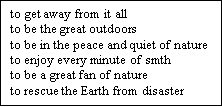 to live in harmony with nature =
to live in harmony with nature =
- Homework.
Зробити серію плакатів на екологічну тему: «Think globally, act globally!»
- Summarizing.
How much of the lesson do you remember: words, word-combinations, sentences? What is possible to do to keep the environment clean and safe, to keep the country rich and beautiful?

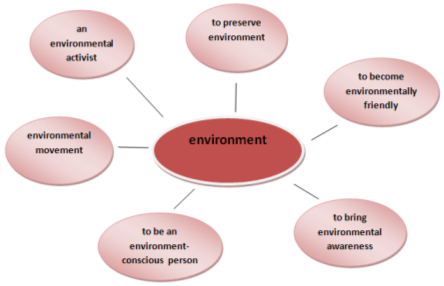
Additions
What is air pollution?
Air pollution (say: po-loo-shun) occurs when gases, dust particles, fumes (or smoke) or odour are Introduced Into the atmosphere In a way that makes it harmful to humans, animals and plant. This is because the air becomes dirty (contaminated or unclean).
The Earth is surrounded by a blanket of air (made up of various gases) called the atmosphere. The atmosphere helps protect the Earth and allow life to exist. Without it, we would be burned by the intense heat of the sun during the day or frozen by the very low temperatures at night.
Anything additional gas, particles or odours that are introduced into the air (either by nature or human activity) to destroy this natural balance can be called air pollution.
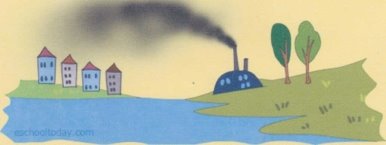
Things that pollute the air are called pollutants. Examples of pollutants include nitrogen oxides, carbon monoxides, hydrocarbons, sulphur oxides (usually from factories), sand or dust particles, and organic compounds that can evaporate and enter the atmosphere.
There are two types of pollutants:
Primary pollutants are those gases or particles that are pumped into the air to make it unclean. They include carbon monoxide from automobile (cars) exhausts and sulfur dioxide from the combustion of coal.
Secondary pollutants: When pollutants in the air mix up in a chemical reaction, they form an even more dangerous chemical. Photochemical smog is an example of this, and is a secondary pollutant.
When pollution occurs in the air, it can easily travel and spread, and because we breathe in air, we cannot easily avoid it.
What is land pollution?
Land pollution is the deterioration (destruction) of the earth's land surfaces, often directly or indirectly as a result of man's activities and their misuse of land resources.
It occurs when waste is not disposed off properly, or can occur when humans throw chemicals unto the soil in the form of pesticides, insecticides and fertilizers during agricultural practices. Exploitation of minerals (mining activities) has also contributed to the destruction of the earth's surface.

Нow can we ensure that our
beautiful community is not polluted?
Since the Industrial Revolution, natural habitats have been destroyed, and environments have been polluted, causing diseases in both humans and many other species of animals.
What is water pollution?
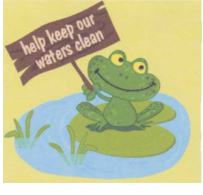
Water pollution is the contamination of water bodies (e.g. lakes, rivers, oceans, aquifers and groundwater), very often by human activities.
Water pollution occurs when pollutants are discharged directly or indirectly into water bodies without adequate treatment to remove harmful compounds.
Water covers over 70% of the Earth's surface. It is a very important resource for people and the environment. Water pollution affects drinking water, rivers, lakes and oceans all over the world. Water pollution is the second most imperative environmental concern along with air pollution.
Any change or modification in the physical, chemical and biological properties of water that will have a detrimental consequence on living things is water pollution.
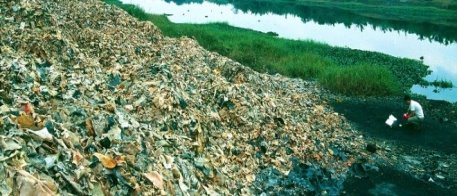
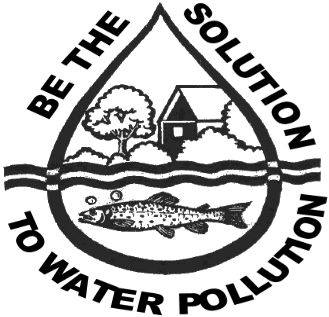

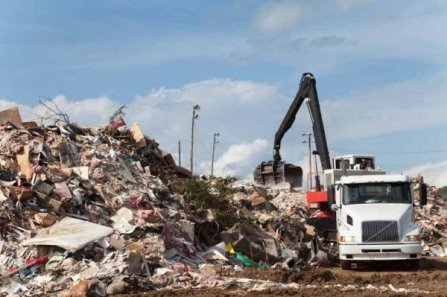
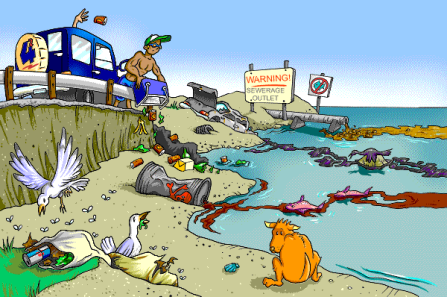
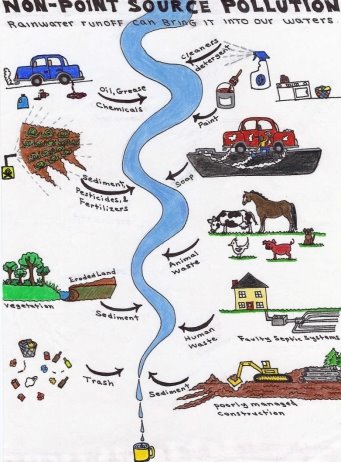
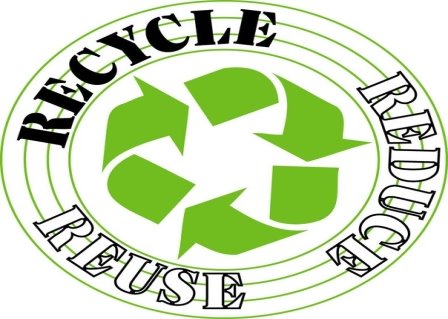
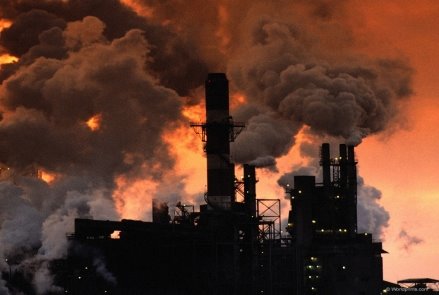


про публікацію авторської розробки
Додати розробку
